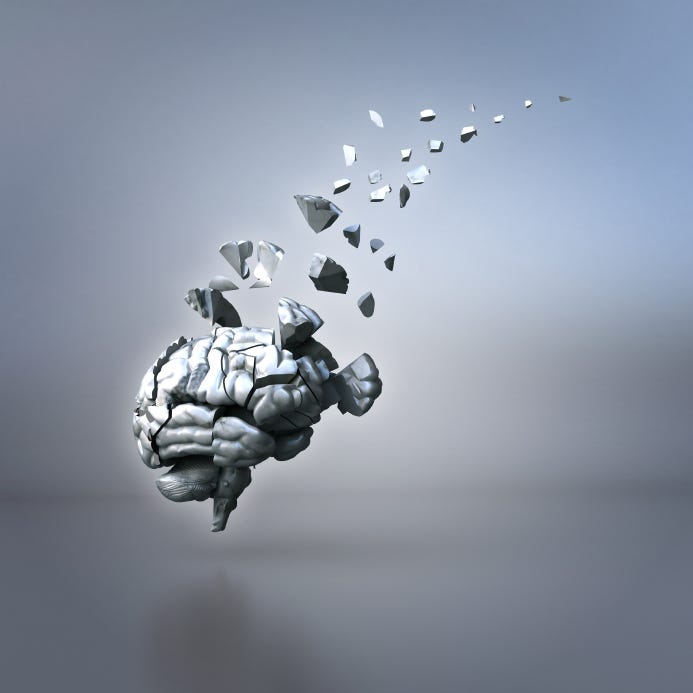Decisions are Embedded in the Matrix of Our Bodies and Relationships
How Emotions Support Our Thoughts
Emotions often get the short end of the stick when it comes to working through the struggles in life. They're either portrayed as the sole problem ("I wish I wasn't so emotional about x") or negatively contributing to the situation ("Emotions are always getting in my way"). Even when discussing so-called "positive" emotions like love and happiness, the tendency is to portray them as being contrary to or unhelpful towards living a more thoughtful and thought-filled life. A favorite example is to consider love as having fallen "head over heels" or some other form of losing one's mind, as if it is a form of madness. Regardless of the example, emotions bear the brunt of responsibility for our bad decisions, as if they’re something that happens to us instead of being part of what we call experience.
Placing emotions in that realm beyond us, as if they’re floating around waiting to attack us like pterodactyls in the latest Jurassic Park movie extravaganza, is a common tactic, despite it not offering any actual help or better understanding of how we make decisions. Examples abound of how emotions override, overcome, or otherwise short-circuit the supposedly separate rational components of our minds. Consider this list from a Psychology Today article entitled "4 Ways Emotions Can Screw Up Your Decisions":
1. Excitement can cause you to overestimate your chances of success.
2. Anxiety in one area of your life spills over into other areas.
3. Feelings of sadness can cause you to settle.
4. Anger and embarrassment can lead to taking a long shot.
These basic concerns to be wary of are all based on two assumptions: 1) the human person is at core a rational entity, and 2) emotions and rationality are in constant struggle. Think the basic plot of “Inside Out” from Pixar. I freely admit that I love the movie, but not because it portrayed cognition in any way legitimately. What can be fun in considering our emotions as separate entities residing in our minds is to put our face on all of them. They’re not separate from us, so much as variations of who we can be. The trick is to not fall victim to thinking of yourself myopically. You’re not a purely rational person like a computer, nor are you at the mercy of emotional entities pulling levers and flipping switches in your brain.
Find Balance by Acknowledging Your Emotions
Concerning the Psychology Today article above, to be fair, the author does note how emotions can be helpful, seeing as how anxiety can keep us from making a bad choice, but fundamentally the conclusion is still that all emotions "distort your thinking."
Let's stop for a moment and reconsider the basic assumption, that of the human person as being at core a rational entity, replacing it with Daniel Siegel's idea of mind:
“A core aspect of the mind is an embodied and relational process that regulates the flow of energy and information.” (Siegel)
This allows us to reflect upon ourselves as being more than a producer of logic, instead bringing in a recognition of our living within particular bodies and through relationships. The body, that repository of "gut feelings" and relationships, the means through which we act, is no longer discarded or considered contrary to or apart from another. Rather, our experiences are both what happens to us and how we demonstrate the path of our lived-in lives.
Consider that we already know the role the body plays, we just often dismiss it. How often have you wondered at your irritation only to remember you haven’t eaten in far too long? Felt the brain-fog of too little sleep? Noted the agitation from an argument in a relationship leading to poor decisions later? Our bodies supply the immediate vehicle for our decision-making process and are intimately connected to the direction we take in our lives. We are embodied and embedded, and as such our mental lives are variably influenced by that physicality and relational life.
Emotions are simply not waiting around to undermine our rational ability, any more than they arise within us to push us towards bad decision-making. Emotions exist as an initial assessment of perception, giving support for our thoughts as conscious experience. It is fair to say that the whole process is one big "thinking response," the difference between emotion and thought only resides in the different areas of the brain where they largely, though not completely, emerge from.
Consider the potential thoughts and associated behavior of a person as being held within a large circle. Emotions don't select thoughts and behavior like a laser-beam, instead they act like exploding paintballs or water-balloons. They capture a large area of potential, not any single action. The behavior that occurs then is a matter of what the person believes they are capable of and the relational context within which they are acting. Being excited doesn't cause us to overestimate our chances of winning and plop down money on the roulette wheel. Instead, surrounded by other eagerly supportive people and flashing lights, being excited places more weight on one set of thoughts/behavior over another, pushing along those that declare "I really need this win" or "If I win this, my problems will be solved."
Placing emotions as contrary to rationality or inevitably connected with "distortion" leads to the creation of a false inner conflict and a dismissive focus on one aspect of our lives over another, ironically supporting the very distortion that was originally attempted to be solved. This is profoundly unhelpful if our goal is to embrace the whole of our lives.
We are not broken or distorted creatures, there is no emotion or thought that is wrong or sinful. Our emotions/thoughts may not, and likely don't, assess the whole of an experience accurately. Acknowledging that we see reality in degrees of awareness can push us to seek expanded understanding, to ask more questions, and operate from a position of humility and open-mindedness rather than dogma. Asking questions does not mean you can’t stand for an opinion, it simply means there are always more things to consider. We can pick a direction with our behavior, but if we’re doing so from an awareness of there being alternatives, we may be more flexible in responding to a world that doesn’t always abide by our wishes and desires.
Recognizing the power of emotions in the process of our decision-making is important, just as it is to understand the ways we think about a situation and the influence of the people we are connected with. The journey here is a constant one of relational discovery as our lives flow within and through our internal and external worlds. Faced with the inevitability of limits to our awareness:
"The best we can do is a compromise: learn to recognize situations in which mistakes are likely and try harder to avoid significant mistakes when the stakes are high." (Kahneman)
Resources:
Kahneman, Daniel (2011-10-25). Thinking, Fast and Slow (Kindle Locations 405-406). Farrar, Straus and Giroux. Kindle Edition.
Psychology Today, "4 Ways Emotions Can Screw Up Your Decisions"
Siegel, Daniel J. (2012-04-26). The Developing Mind, Second Edition: How Relationships and the Brain Interact to Shape Who We Are (p. 2). Guilford Publications. Kindle Edition.
Barrett, Lisa Feldman, How Emotions are Made



